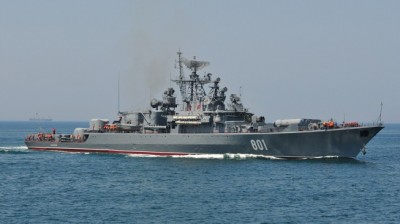Russian naval force arrives at Syria port in ‘show of solidarity’
By SUA Intelligence Staff
A large Russian naval force arrived at the Syrian port city of Tartus, the French AFP news agency reported on Sunday, in what the regime of President Bashar Assad is calling a show of “friendship.” Last November, a Syrian news agency reported that Russian warships were planned to arrive at Syrian territorial waters, indicating that the move represented a clear message to the West that Moscow would resist any foreign intervention in the country’s civil unrest. Citing the official Syrian news agency SANA on Sunday, AFP reported that a large Russian naval flotilla, led by an aircraft carrier, is making a six-day port call to Tartus. SANA also quoted a Russian naval officer as saying that the visit was “aimed at bringing the two countries closer together and strengthening their ties of friendship.”
“The commanders of the Russian naval vessels docked in Tartus took turns to express their solidarity with the Syrian people,” SANA added. According to Al Arabia news agency, the deployment of the Russians in Syria and the thousands of U.S. troops in Israel has raised speculations of an imminent war and Iranian officials believe that this is the latest and most blatant warning that the US will soon be attacking Tehran. An Egypt-based military expert, major general Jamal Mathloum, said that “there is a military strategic cooperation between the U.S. and Israel since the 1980s and there is definitely mutual understanding,” adding that the U.S. troops deployment might not necessarily mean a direct signal of war, but could be read as Israel and U.S. readiness in case of a conflict arising in the region.
“There is already a U.S. radar station in southern Israel, and might as well contain from 500 to 700 American soldier operating there,” Mathloum said. But for Abdulaziz Sager, chairman and founder of the Gulf Research Center in Dubai, the deployment of U.S. troops in Israel is “definitely to send a clear signal to Iran.” Sager said that there is a U.S.-Israel defense agreement that makes defending the Jewish state an obligation to the United States. In addition to that, U.S. President Barack Obama said in his last AIPAC meeting that the United States does not rule out any option against Iran if it had to. According to Israeli official sources, about 9,000 U.S. soldiers have already arrived in Israel. There will also be an establishment of U.S. command posts in Israel and IDF command posts at EUCOM headquarters in Germany – with the ultimate goal of establishing joint task forces in the event of a large-scale conflict in the Middle East, the sources reported.
But according to Elia Henna, a Lebanon-based expert in military issues, the deployment of 9,000 U.S. troops in Israel goes back to the U.S. withdrawal from Iraq and to further the U.S. presence in the region and not to leave the “Arab field” open to further Iranian influence. Asked on why the United States did not increase its troops numbers in its military bases in the Arab Gulf, Henna said that both countries [Israel and United States.] have far more compatible militaries and are bound with military agreements and that the United States has more freedom in Israel. “Israel does not mind even if one million U.S. soldiers to be deployed in the Jewish state,” he added. Despite U.S.-Israel furthering their combative cooperation in light of the crisis looming around Iran, the Islamic Republic remains unyielding.
On Sunday, head of Iran’s Atomic Energy Organization Fereydoun, Abbasi Davani, reportedly said that Iran’s underground uranium enrichment facility will go on stream soon. Davani said that the Fordow nuclear enrichment plant will be operational in the near future and that around 20 percent, 3.5 percent and four percent enriched uranium can be produced at the site. “There is no third party to verify about the site [Fordow] and truth about the announcement,” said Sager, adding “they can say all they want to say but there is no confirmation or verification.” Asked about the nature of the attack against Iran if there will be one, Sager said there will be a surgical and not a complete one since Iran cannot afford to, but it will be leaving the Gulf Arab or the surrounding region of Iran in dire environmental consequence.


